This will generate the set you want, but in a different order (I sort by alphabet at the end, you'd want to sort by length as well).
You'll end up with:
a
ab
abc
abcd
abcde
abce
...
d
de
e
So, every possible subset (aside from the empty string), while maintaining the order of the original list.
The idea is to add each element to to a growing list. With every new element, add it first, and then add it to all existing elements.
So, start with 'a'.
Go on to 'b'. Add it to the list. We now have {'a', 'b'}.
Add it to existing elements, so we have 'ab'. Now we have {'a', 'b', 'ab'}.
Then 'c', and add it to existing elements to get 'ac', 'bc', 'abc': {'a', 'b', 'ab', 'c', 'ac', 'bc', abc'}. So forth until we're done.
string set = "abcde";
// Init list
List<string> subsets = new List<string>();
// Loop over individual elements
for (int i = 1; i < set.Length; i++)
{
subsets.Add(set[i - 1].ToString());
List<string> newSubsets = new List<string>();
// Loop over existing subsets
for (int j = 0; j < subsets.Count; j++)
{
string newSubset = subsets[j] + set[i];
newSubsets.Add(newSubset);
}
subsets.AddRange(newSubsets);
}
// Add in the last element
subsets.Add(set[set.Length - 1].ToString());
subsets.Sort();
Console.WriteLine(string.Join(Environment.NewLine, subsets));
